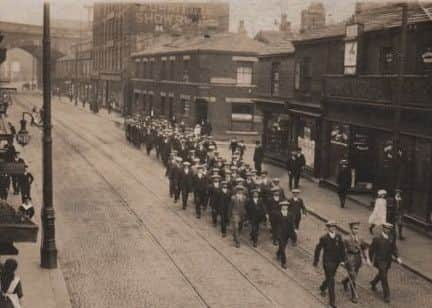The Nostalgia Column with Margaret Watson


This was the day the guns fell silent and a weary nation was told that at last it was “all over”, but sadly for many it wasn’t and for some it never would be.
Thousands of local men were still overseas waiting for demobilisation and would not be reunited with loved ones for some months to come..
Advertisement
Hide AdAdvertisement
Hide AdHundreds were also in prison camps waiting to be repatriated with their units, and there were many more still in army hospitals across France.


Back home, however, the mood was jubilant with people taking to the streets, singing and dancing, and church bells, which had been silenced during the war, were ringing out joyfully across the valley.
Bonfires were lit, fireworks displayed, and local farmers provided sheep and oxen to be roasted and shared among the local population at impromptu parties.
But for some this was not how the Armistice should have been celebrated and they were not afraid to speak out against such festivities.
Advertisement
Hide AdAdvertisement
Hide AdThey railed against such scenes of joy and jubilation being expressed so freely, and called for people to be more mindful of those still in deep sorrow.
The critics were mainly members of the old borough council who felt the Armistice should be celebrated decently and with order and not with junketing.
They were happy to contribute £3,000 to celebrating the Armistice but in a way they felt fit and certainly should not include any kind of feasting.
One member, Sir Mark Oldroyd, had been disappointed at the sight of such feasting in the town when there were people still grieving the loss of a child, father, husband, brother.
Advertisement
Hide AdAdvertisement
Hide Ad“We ought to remember at this hour all those hundreds and thousands of people in this town whose rejoicing is tempered with sorrow and sympathy for those who have been bereaved,” he said.
“The council should not do anything wild, extravagant or unbecoming or anything which will wound hearts so tender and susceptible.”
It was agreed that a service of thanksgiving should be held and afterwards a public event involving local school children with the emphasis on world peace.
A public holiday was also declared with mill owners and other employees announcing they would not allow their work people to suffer any financial loss by not going into work that day.
Advertisement
Hide AdAdvertisement
Hide AdSir Mark, a mill owner himself and a strict teetotaller, trusted that the holiday would be free from all excesses, and that time would be spent in humble acknowledgement of God’s goodness to them.
He said: “The greatest of all victories should be celebrated with sobriety and dignity and with recognition of the Divine guidance, wisdom and gracious mercy which brought peace to the world.”
Within days of the Armistice being declared local shops and businesses were quick to capitalise on it with shops urging customers to start spending.
Dewsbury’s top departmental store reminded customers that their new range of ladies wear would delight the eye and charm the hearts of the boys coming home.
Advertisement
Hide AdAdvertisement
Hide AdThey advised lady customers that now the fighting was over and the country was at peace they should “dress well and be cheerful and smart.”
The military were also quick to recoup some money by selling off surplus army garments no longer necessary now the war was over.
A local auctioneer, acting under instructions from the Ministry of Munitions, offered for sale 11,000 articles of part-worn Army clothing suitable for civilian wear.
Those attending the auction were second-hand clothes dealers, owners of common lodging-houses and other clothes dealers, many from Manchester, Leeds and Barnsley.
Advertisement
Hide AdAdvertisement
Hide AdAmongst the items sold, most of which were uncleaned and unrepaired, were 3,110 pairs of socks, 150 cardigan waistcoats, 3,000 blankets, 3,100 sheets, 25 great coats, 2,000 vests and 1,000 shirts,
In the meantime, thousands of Dewsbury and Batley men were still in uniform in countries throughout the world, wondering if they might be home for Christmas. They were not.
For the demobilisation of millions of men in an orderly and fair way and as speedily as possible, would prove to be a tremendous problem for the military.
Generally, those who had a job waiting for them were allowed to return first, with the release of other men proceeding under a scheme of priority.
Advertisement
Hide AdAdvertisement
Hide AdMarried men were given preference over single, but a certain number of long-serving and pre-war enlisted men, were included in each draft home.
Men who hadn’t a job waiting for them, and whose work in civilian life was not of urgent national importance, were formed into “skeleton units” to deal with guns, stores and horses etc.
Prisoners of war, the sick and the wounded in medical care were demobilised once they were physically fit for civilian life.
The concentration camps used by the Germans were put into good use as holding camps for those being demobilised.
Advertisement
Hide AdAdvertisement
Hide AdSoldiers living in Dewsbury and Batley were sent from their unit to one of these camps which had been set aside for men from the West Riding.
The war was quickly forgotten back home and all the talk now was of peace and re-establishing industries and getting men back working to rebuild the country.
What no one could have foreseen was that 20 years later, many of those demobilised men would be back fighting again, and so would their sons.